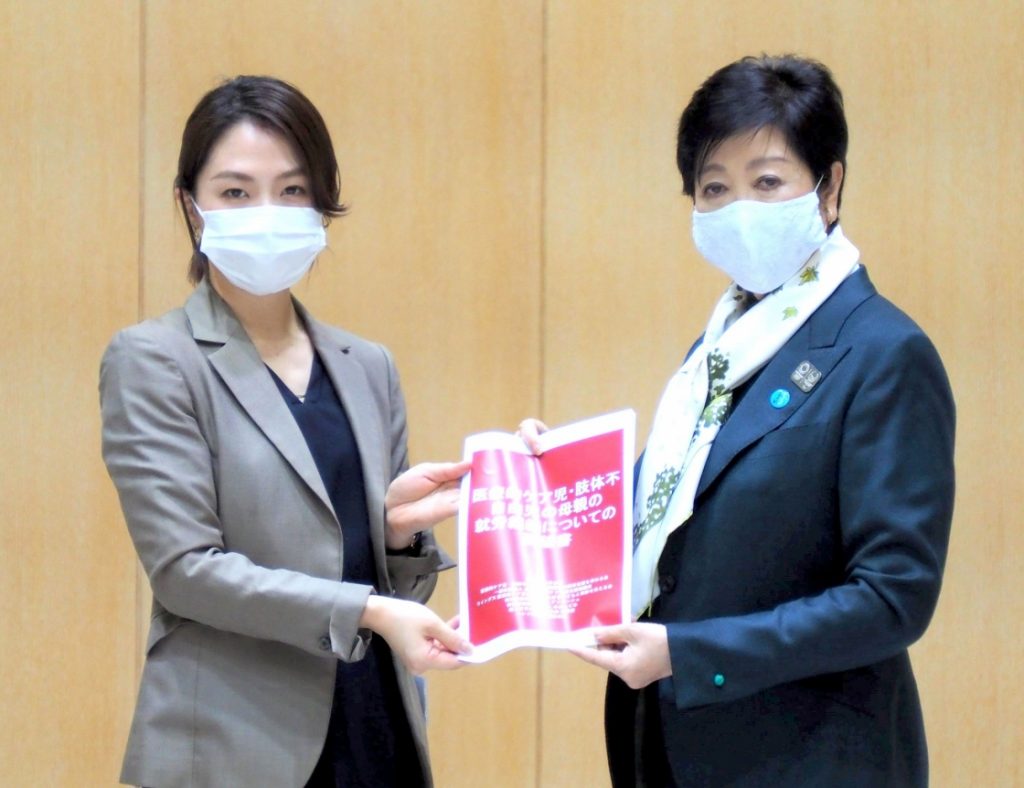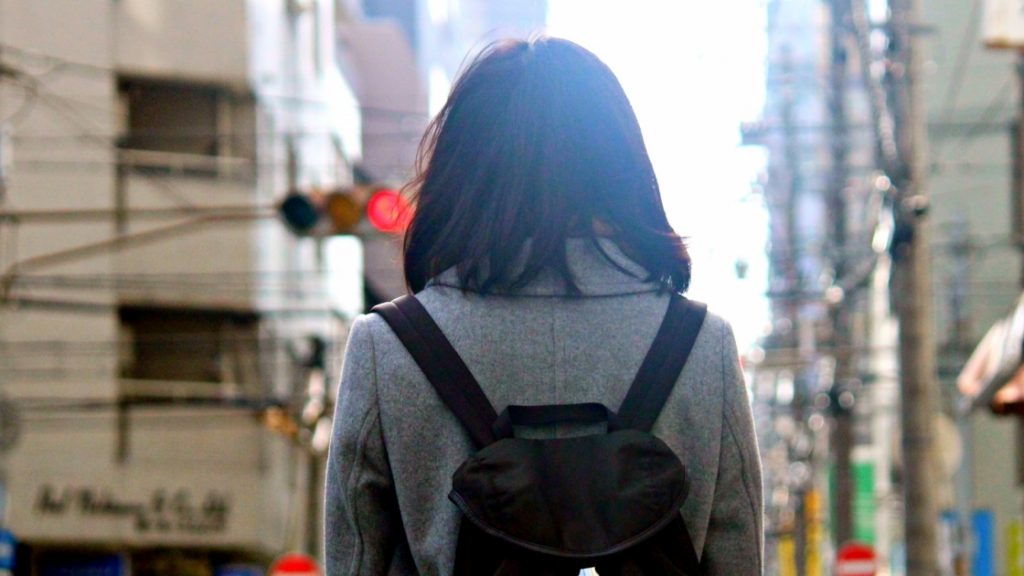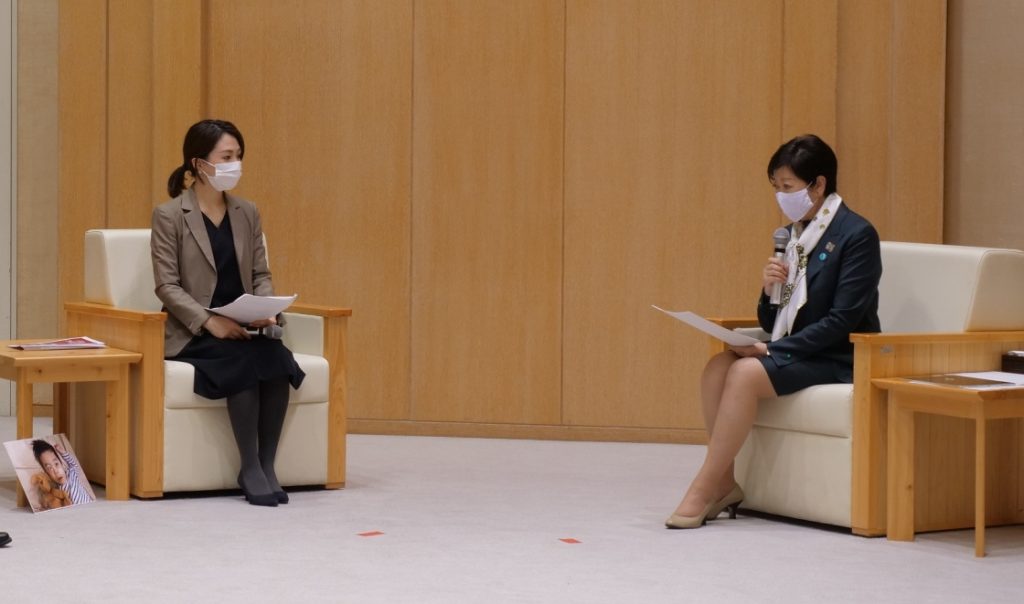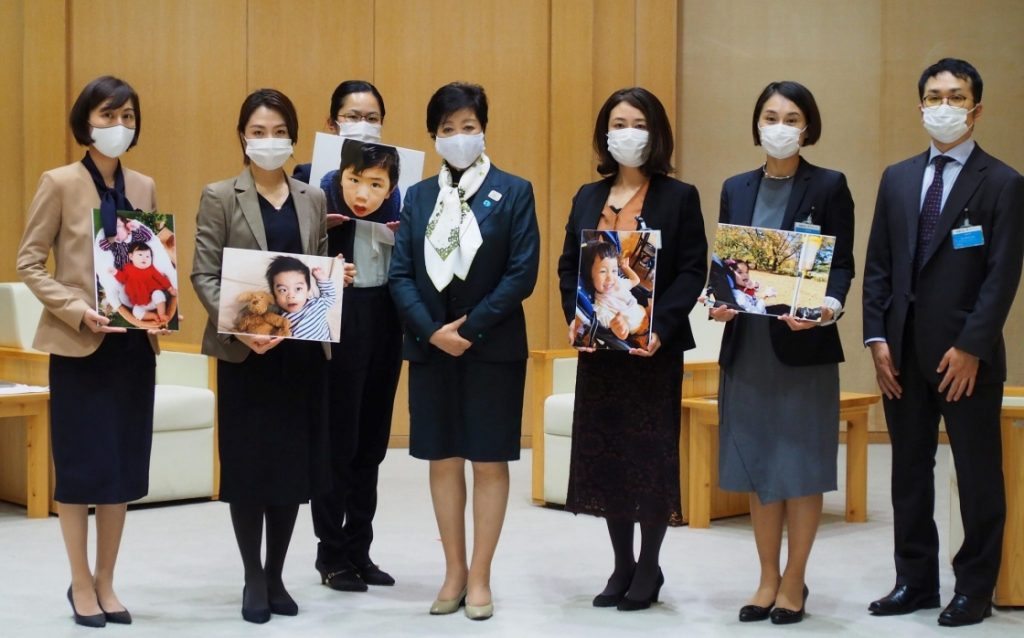Solve “the barrier of the first grade of medically-cared children” problem! Parents of Helen nursery school for children with disabilities lobbied the governor of Tokyo.

On Wednesday, November 25, the Association for Employment Support for Parents of Medically-cared Children and Children with Physical Disabilities and related organizations, mainly parents who use Helen nursery school for children with disabilities operated by Florence, met with Tokyo Governor Yuriko Koike to submit a request for continued employment for parents of medically-cared children and children with physical disabilities who have reached school age.
What is “the barrier of the first grade of medically-cared children” that awaits them after graduation?
Medically-cared children are those who need medical care, such as aspiration and tube feeding, to live . With the development of neonatal care, the number of these children has doubled in the past decade to about 19,000 nationwide.
Medically-cared children require specialized care by parents and nurses, making it very difficult for them to enter regular daycare.
Florence launched a childcare service for children with disabilities in 2014, and have been providing childcare to children with medical care needs as well as supporting their parents’ employment through “Helen,” the first nursery in Japan to provide extended daycare with medical care, and “Annie,” a one-on-one childcare service that visits the home of children with disabilities.

In addition, we have recently started taking care of medically-cared children at a licensed nursery school in Tokyo, and Florence has been commissioned by the ward to provide training for nursery staff and nurses.
Six years after Helen’s start and five years after Annie’s start, the number of children leaving the nursery school is gradually increasing, and a new barrier is looming in front of the parents. It’s all about after-school care.
After-school care for medically-cared children, which is in extremely short supply
“After-school day services” are available as after-school care facilities for children with disabilities.
Currently, the number of after-school day services that accept medically-cared children and children with physical disabilities is very limited even in Tokyo. In addition, there are still no providers in Tokyo that take care of children for long enough for parents to continue working full-time.
Even if they are able to work by attending a nursery school, their careers will be cut short.

The more children are taken care of, the more difficult it is to manage…a structural challenge
Although after-school day services are paid according to the number of days used by the user, medically-cared children tend to cancel at short notice due to their physical condition, which makes income unstable for the provider.
On the other hand, staff and nurses need to be kept on hand on a fixed basis, which creates a structure in which the more medically-cared children are taken care of, the more difficult it becomes to operate.
In addition, the current lack of sufficient subsidies for the placement of nurses makes it difficult to place nurses in the first place, leaving the care of medically-cared children to the self-help efforts of providers.
In order to increase the number of after-school day service establishments that provide medical care, and to enable stable operations and long hours of care, it is urgently necessary to set up a system that provides appropriate evaluation and subsidies for taking care of medically-cared children.
In addition, since it is difficult for medically-cared children and children with physical disabilities to move from school to school by themselves after school, and there are few after-school day services that provide transportation support, it is also necessary to establish after-school day services and schoolchildren’s services for medical care within special-needs schools, as well as expansion of home-visit support so that children can spend after-school hours at home when they are not feeling well.
We need to make our voices heard right now” – – parents’ determination

I hope I could stay with the smiling Helen forever, but the kids are growing up so fast that it’s time to think about where to place them in the community after they graduate from Helen.
In September of this year, I received an email from three parents of Helen nursery school for children with disabilities.
They told me that it was difficult for them to continue working after their children graduated, and that they were trying to take a parent-led advocacy initiative to change this situation.
The email was carefully written, with words of gratitude and determination.
“If we don’t take action, the situation will remain the same and our continued work after graduation from Helen will remain quite challenging.
The situation for medically-cared children has changed dramatically over the past few years. I think the reason for this is the creation of Helen and the fact that some of our ward nursery schools have begun to accept medically-cared children. It used to be a dream come true to work while raising medically-cared children. but thanks to the cooperation of the nursery schools, we have become the first generation of people who are able to balance work and raising medically-cared children.
We feel more strongly than ever about continuing to work after school, and we are now in a position where we need to speak up.
We consult with Mr. Komazaki because, with Florence’s support, we are able to live a happy life.
After the birth of our child, we suddenly found ourselves living with a disability. I had never been surrounded by people with disabilities in my life, and I was overwhelmed with anxiety about what life would be like and whether my child would be happy. We thought we would have to quit our jobs, not only because of our children, but also because there were no daycare that would accept medically-cared children, and we couldn’t even apply for daycare while moms worked hard to keep their children in daycare. We met Helen, we were saved.
Thanks to Helen, we were able to return to work, which we had given up on, and we were able to work as usual. We were able to feel again the meaning and satisfaction of working and the joy of participating and contributing to society. And most importantly, the child now has a place called Helen, and she is growing up healthy and happy in the company of her favorite teachers and friends.
(Omission)
Helen not only made it possible for a child with a disability to find a place and for her mother to stay in the workforce, but she also taught me that there is a lot of joy and happiness in being disabled. And I believe that the teachers’ outpouring of love will be a treasure for the child in the future. “
Attached to the email was a letter of request that they submitted to their ward, the signatures and messages they collected from parents at the school, and the results of a survey they took of mothers in the community.
I immediately set up an online MTG with the parents. I provided them with examples of policy advocacy that I had implemented so far and promised to support their advocacy efforts as much as possible.
On Wednesday, November 25, we’ll be meeting with the Governor of Tokyo!
The parents’ hard work was realized, and the circle of cooperation spread to various parties and support groups. Finally, their voices have reached the Governor of Tokyo.
On Wednesday, November 25, at the Tokyo Metropolitan Government Office, Ms. Matsuoka, the representative of the “Association for Employment Support for Parents of Medically-cared Children and Children with Physical Disabilities,” handed a letter of request with the following four recommendations to Tokyo Governor Yuriko Koike.

・Please provide “subsidies for day-care services for severely mental and physical disabled children and medically-cared children” to enable after-school day services to take care of severely mental and physical disabled children and medically-cared children for extended periods of time.
・In order to support mothers’ employment, please invite “after-school day services” for medically-cared children and children with physical disabilities to be accepted in the building of a metropolitan special needs school or establish “a metropolitan after-school child day care club for disabled children”.
・In the case of children with physical disabilities, please create new support for them to spend their after-school hours at home, or make in-home child development support available for the purpose of employment support as well.
・Please cover the cost of “proxy” chaperones at public expense for parents who need to work during the medical care handover at school.
I was also present at the meeting as a representative of Florence / Secretary General of the Council for the Support of Medically-cared Children.

The Governor of Tokyo made the following comments: “I would like to make Tokyo a city where everyone can work in their own way, making the most of their abilities. To that end, I would like to promote the improvement of the environment.
At Florence, I have been leading many policy advocacy activities, and we have been working to resolve issues through both business and advocacy.
In this social action, the parents and their children, who have been involved and walked together through the program, took an unprecedentedly big step forward to take the baton of change and connect it to the next generation of parents and children.
We hope that this initiative will lead to a solution to the “the barrier of the first grade of medically-cared children” problem.
Florence and the Council for the Support of Medically-cared Children will continue to be a “crew” in the same boat as the parents and children, working together with the medically-cared children and their families to work the social problems surrounding them.
新着記事トップ5
To Global communityの最新記事
-
A first for Shibuya Ward! Licensed nursery school begins taking care of medically-cared children. Florence provided training for childcare workers and nurses.
-
“They are there for my son, who is intellectually and physically developmentally delayed and in need of medical care, and are comrades to my family. Teachers in Annie are invaluable.” – a former user of Annie home care for children with disabilities.
-
Start of the “Kodomo-Takushoku(Food delivery program for children and families) ” for members of the sick child care program for single parents! We delivered groceries and household items.
